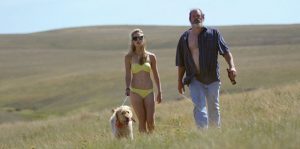
Loss and grief are increasingly variant when it comes to life events. They both find their way into the nooks and crannies of your life, seeping into your very being in order to tear you asunder and discombobulate. That’s pretty much the through-line of Andrew Kightlinger’s 2017 film, Tater Tot & Patton.
The opening scenes introduce us to Patton (Bates Wilder) in his natural environment: drunk, half-naked and grizzled on his expansive patch of farmland. The high point of his morning routine is a splash of water to the face. It helps, he supposes, to at least appear presentable to his troubled and somewhat spoiled niece from LA, Andie aka “Tater Tot” (Jessica Rothe). Andie is no angel either. Destitute and completely out of her depth in the wilds of South Dakota, she’s landed in Patton’s corner of the heartland to get back on track after some tragic self-harm.

“…landed in Patton’s corner of the heartland to get back on track after some tragic self-harm.”
Of course, the two kick it off swimmingly. Patton goes for the “spare the bean, spoil the fiend” approach, subjecting Andie to a diet of baked legumes, farm work, and curbstomped phones. Andie reacts like any semi-normal millennial would, with yelling, screaming and a lot of cursing. It’s the classic “odd couple” dynamic that somehow doesn’t exhaust itself between the players. Under Kightlinger’s direction, Patton and Andie’s interactions—sometimes violently and sometimes much more subtly—swing along the emotional pendulum as the narrative progresses. Wilder’s gruff, perpetually inebriated effect is the stone against which Rothe’s deluge of youthful reticence and small bursts of vulnerability ebb and flow. From good to bad moments, the two maintain an energy that endures even when the film hits its sleepiest moments.
The high point of this dynamic arises when Andie uncovers the truth about her aunt, Patton’s wife, and the reality of its impact on his life. It’s an artful moment because, like much of the rest of Tater Tot & Patton, it’s about what’s not said, seen and shown. Rather, it’s what Andie pieces together and what Patton is unable to say directly. In the silences and follow up questions, we get a beautiful dance of omission; Kightlinger makes us work to get to the next logical moment versus beating us over the head. Additionally, we get crucial pathos and information that provides much-needed cause for the litany of self-destructive behavior throughout Tater Tot & Patton.

“…character study between two people played backward…”
Tater Tot & Patton is Kightlinger’s character study between two people played backward, and on a structural level, that third act revelation justifies the film’s runtime. He gives us everything but the exact information we need until the last possible moment. It’s an interesting approach, but also one that can be trying, considering the quietness and facsimile to real-life grief that the film works towards. At times, I questioned why I cared about Andie and her uncle. And I’d venture to say it also made me question why I watched the film all the way through.
However, this could simply be a difference of palate and a question of trauma. Tater Tot & Patton is a purposely extended experience that relentlessly approaches the ideas of loss, grief, and mourning—of relationships, people and pleasures past. And if one is not in the mood to experience such a thing both in-film and metaphorically through the experience of watching the film, it can be maddeningly exhausting. As someone who’s recently lost someone close to me, it was hard to keep spooling the thread without looking inward into the maw of melancholia. Which, all things said, may mean Tater Tot & Patton got it exactly right. It’s a conclusion that rallies around a lot of raw emotional territory. But it’s ultimately a triumphant one that the film deserves for what it does do to replicate such a complex and unyielding human reality, from inception to closure.

Tater Tot & Patton (2018) Directed by Andrew Kightlinger. Starring Bates Wilder and Jessica Rothe.
8/10 Plates of grilled rattlesnake

Good ending.turned intoamovie withsomeclass.very different wasittrue? Hate stupid endings.life is so shorttakes atragedy to make good changes sometimesno sex betweenthem.verygood
I should have caught the powerful metaphore. Of the gate – open -shut an the rattle snake. – d’accord ngerou s an finally. A tamed play thing
It was perfect. He portrayed what life on a ranch is like flawlessly. Especially at the end when Patton pets and nuzzles the farm dog, then realized what he was doing and gruffly orders it out of the truck. “Shut the gate” is my new motto!
Love this movie!